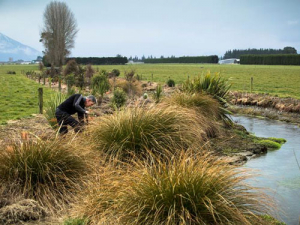Fonterra Suppliers Confident in Mainland Dairy Future
Fonterra's 460 milk suppliers in Australia, who will switch to Lactalis end of this month, are unfazed with the impending change.
 Fonterra has launched a plan to help improve NZ waterways — and every day Kiwis have been invited to view the efforts.
Fonterra has launched a plan to help improve NZ waterways — and every day Kiwis have been invited to view the efforts.
Fonterra has launched a plan to help improve NZ waterways — and every day Kiwis have been invited to view the efforts.
Based around six strategic commitments, the plan will underpin Fonterra’s efforts to promote healthy streams and rivers, including a strong focus on sustainable farming and manufacturing.
The co-operative’s farmers will also open up their farms around New Zealand to give Kiwis the chance to see first-hand the efforts farmers are making to increase water quality.
Fonterra says the plans signals the co-op’s desire to play an active role in delivering healthy waterways for New Zealanders and builds on previous efforts in this space. Recent examples include Fonterra’s commitment to restore 50 key freshwater catchments, its membership the Farming Leaders’ Pledge and work with the Department of Conservation on the Living Water initiative.
Miles Hurrell, chief operating officer, Fonterra Farm Source, says the co-op and its farmers had been working hard to address water quality, but were ready and willing to do even more.
“Like all Kiwis, we want healthy rivers. Our farmers have spent over $1 billion on environmental initiatives over the past five years and fenced more than 98% of significant waterways on farm. That’s a major undertaking but it highlights our commitment to getting this right and we’re already seeing that in some regions these actions are having a positive impact on water quality.
“All intensive land uses have had an impact on water quality in this country. That’s why we have to work together to address the issue. Today, we’re putting up our hands and promising to work with communities to promote healthy waterways for Kiwis to enjoy. Importantly, we’re backing up our words with action and making tangible commitments that we believe will make a real difference,” says Hurrell.
Fonterra’s six water commitments are as follows:
1. Farm within regional environmental limits
2. Encourage strong environmental farming practices
3. Reduce water use and improve wastewater quality at manufacturing plants
4. Build partnerships to improve waterway health
5. Invest in science and innovation to find new solutions
6. Make the products people value most
Each of Fonterra’s commitments is underpinned by a set of actions. These range from supporting regional councils to set environmental limits for water use, investing $250 million to drive a 20 percent reduction in water use across its 26 manufacturing sites and almost doubling the co-op’s network of Sustainable Dairy Advisors.
“We’re keen to show New Zealanders the hard work going on behind the farm gate, so on 10 December we’ll be hosting one of New Zealand’s largest ever community open days, giving people across the country the chance to visit a farm and see what we’re doing for themselves. Our farmers are looking forward to opening their gates,” says Hurrell.
DairyNZ Chair Tracy Brown has seen a lot of change since she first started out in the dairy sector, with around one-third of dairy farmers now women.
Castle Ridge Station has been named the Regional Supreme Winner at the Canterbury Ballance Farm Environment Awards.
The South Island Dairy Event has announced Jessica Findlay as the recipient of the BrightSIDE Scholarship Programme, recognising her commitment to furthering her education and future career in the New Zealand dairy industry.
New Zealand and Chile have signed a new arrangement designed to boost agricultural cooperation and drive sector success.
New DairyNZ research will help farmers mitigate the impacts of heat stress on herds in high-risk regions of the country.
Budou are being picked now in Bridge Pā, the most intense and exciting time of the year for the Greencollar team – and the harvest of the finest eating grapes is weeks earlier than expected.
OPINION: Expect the Indian free trade deal to feature strongly in the election campaign.
OPINION: One of the world's largest ice cream makers, Nestlé, is going cold on the viability of making the dessert.